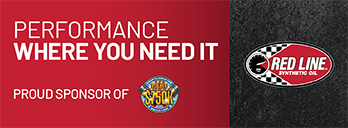NMCA RACER TO LEADERS: NO WHEELIE BAR RULE IS UNSAFE
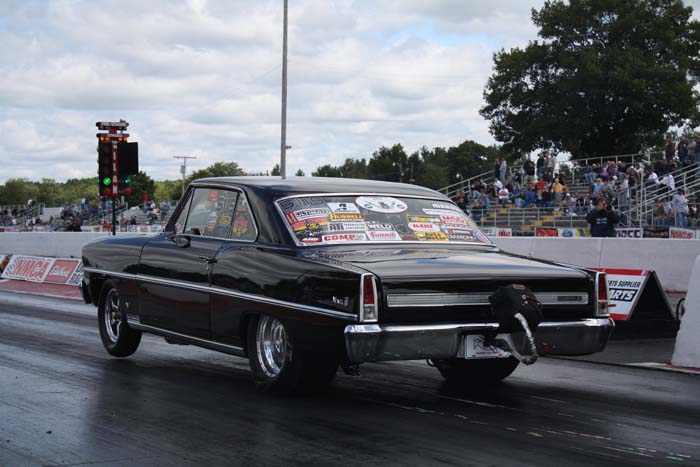 stock-type chassis and 10.5-inch wide tires. Entries are permitted small block and big block engines up to and including a maximum of 565 cubic inches (depending on combination).
stock-type chassis and 10.5-inch wide tires. Entries are permitted small block and big block engines up to and including a maximum of 565 cubic inches (depending on combination). Pro Stock rules permit a variety of race-proven modifications and performance ¬ enhancements on stock bodied, stock appearing -vehicles. One enhancement not allowed is the use wheelie bars.
Past NMCA champion Butch Kemp and his fellow NMCA Pro Stock racers don't like the “no wheelie bar” rule. Kemp and his peers who faithfully supported the class have decided without wheelie bars the risk is too great for the potential reward. In this case, Kemp says the reward is his just being able to race safely.

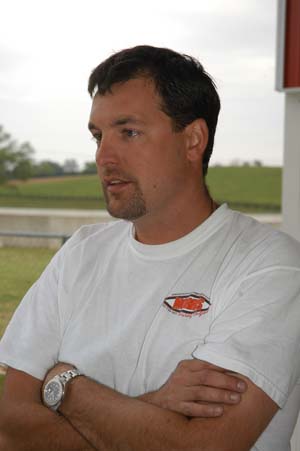
The NMCA’s Pro Stock division is a naturally aspirated class designed for 1950 and newer American production cars and trucks that are equipped with stock-type chassis and 10.5-inch wide tires. Entries are permitted small block and big block engines up to and including a maximum of 565 cubic inches (depending on combination).
Pro Stock rules permit a variety of race-proven modifications and performance ¬ enhancements on stock bodied, stock appearing -vehicles. One enhancement not allowed is the use wheelie bars.
Past NMCA champion Butch Kemp and his fellow NMCA Pro Stock racers don't like the “no wheelie bar” rule. Kemp and his peers who faithfully supported the class have decided without wheelie bars the risk is too great for the potential reward. In this case, Kemp says the reward is his just being able to race safely.
The NMCA disagrees, citing drag racing has its inherent risks, and in allowing the device which prevents cars from flipping over backwards would compromise the integrity of the class.
There is a line drawn in the sand and neither side is budging.
“When you have a group of racers who have won races and set records, and supported the class since it started, and they say this is what we want, and the class is going a second-and-a-half faster and they don’t want to hear it … we just decided not to come back. At the last race they had three cars. Two of those three cars were owned by one person,” Kemp explained.
Charlie Harmon, President of the NMCA, believes if the wheelie bars come into the show, it will be used more as a tuning tool by some of the higher financed teams and in the end will kill the intent of the class.
“We want this to be a driver’s class – that’s more exciting and creates more longevity in the class,” explained Harmon. “It’s not easy to drive one of these cars when you don’t have that safety cushion back there. It’s certainly not easy to tune one of them either. We believe that creates parity which in turn leads to longevity. If you make it more of a dollar class, you will have a decline.
“If a guy the stature of Don Bowles is pulling his hair out, when you add wheelie bars, he’ll just stand it up on the bumper and let his bank account pay for the horsepower.
“I can respect these guys for wanting it, but in the long term survival of the class, it’s necessary we stick to a no-wheelie bar rule.”
Kemp said his group first broached the subject late last year with the management of the NMCA. He had wrecked one of his championship-contending Chevy IIs following a large wheelstand during the NMCA event in Milan, Mi. Kemp said his car pulled a three foot wheelstand and it carried for nearly 300 feet. The chassis became unstable upon landing and flipped, destroying the car.
At the Performance Racing Industry trade show in Orlando, Fla., in December, Kemp alleges that he brought a petition signed by his fellow racers in the eliminator class seeking a wheelie bar rule for safety purposes.
“They basically crumbled up the petition and threw it on the ground,” said Kemp. “There’s a handful of drivers with purpose-built cars for the class, past champions, who won’t race because of that. We tried to let them know we were tired of traveling 600 miles or so, just to stand the car up and crush headers and oil pans, and crash our cars. We stuck to our guns and haven’t been back to race in a year.”
At the last two events on the tour, Chicago and Concord, NC, only three cars have participated in Pro Stock competition, which is currently sponsored by Comp Cams.
Harmon wouldn’t say whether the lack of participation puts the class on the chopping block for 2011.
“That’s going to be up to economics,” Harmon explained. “This is one of the classes hit the most. I feel like we have adequate support from racers and sponsors. That will be determined by that support in the future.”
As for the racer’s safety concerns, Harmon doesn’t buy into the safety issue.
“If it was that big of a safety issue, the Good Housekeeping Seal of drag racing, the NHRA, would make them mandatory. In Stock and Super Stock, you don’t see them mandatory,” Harmon offered.
The NHRA only requires their nitro and Top Alcohol divisions to run wheelie bars.
Kemp disagrees with Harmon’s assessment.
“In my opinion, absolutely,” Kemp answered when asked if it was a safety issue. “Todd Goodwin had a beautiful Viper and crashed in 2005 and had a halo in his spine, had a crash like I did. I walked away luckily with a bruise. There have been several other crashes in our class. Somebody is going to get hurt badly. Or they are going to go over into the other lane and hurt someone or someone is going to get killed. It’s not worth it.”
Todd Goodwin was injured in a 2005 crash at the NMCA’s Memphis Motorsports Park event. His Viper pulled a wheelstand and subsequently rolled after the front wheels hit the ground.
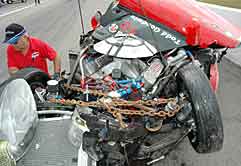
The NMCA hasn’t deviated from their stance that if these racers don’t want to race in the Pro Stock division without wheelie bars, other classes exist where they can run them although Harmon admitted their current combination might not be as competitive.
Kemp admits there are faster no wheelie bar classes. The big difference, he says, there are power adders allowed which can control the ability to wheelstand at launch.
“There’s a lot of no wheelie bar classes where they run quicker than us,” said Kemp. “We as a group got together and said this is what we want and we’ve stuck to that.
“When you run in a naturally aspirated class, if you don’t make it to the 60-foot or 330, you are going to get beat,” Kemp continued. “That’s it. We don’t have any progressive controllers to turn on racing naturally aspirated. We have what we have right there on the starting line. We can sit in the lanes and if the temperature is high we should be fine, but let there be a 10 degree temperature change and this thing is going on the bumper. That change could happen between the time we tow to the line until we finally get to run. I could tie the front end down, and put weight on the front end, but the car isn’t going to perform the way it should. We are on the edge.”
For now, Kemp and his fellow competitors have found other outlets to satisfy their need to race.
“Bottom line is me and the other guys are racing elsewhere,” Kemp said. “There are other places to race. We just don’t choose to tow 12 to 15 hours and run the risk of wrecking our stuff, breaking our stuff and getting hurt. It’s not worth it.”
Kemp quickly admits he misses racing in NMRA Pro Stock and if the organization decides to allow wheelie bars, he and the boycotting racers will return to competition.
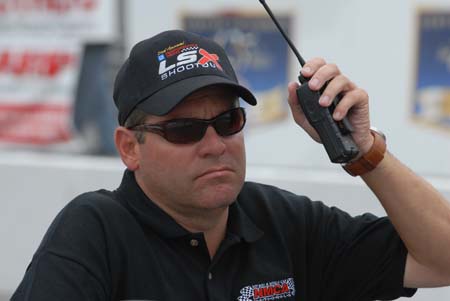
“I’ve told them that,” Kemp said. “The last race I was at with them, I had qualified No. 1 and was the record holder. That race I had .09 on the field.
“I have a Mustang now that I bet would be able to go right to the top again,” Kemp added. “This is 2010 and I work as hard for my money as everyone does.”
While Harmon can appreciate their concerns, he’s adamant in his belief he’s looking out for the future.
“We have classes where wheelie bars are accepted,” Harmon said. “Wheelie bars have never been allowed in this class. As long as I am involved, I don’t know that they will be either.”

